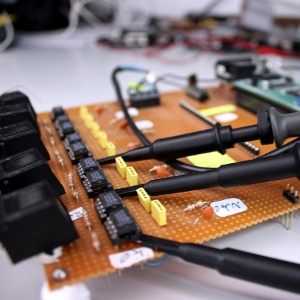CANbids — CAN-Based Infrastructure for Dependable Systems
This work is supported in part by the Spanish Science and Innovation Ministry with grant DPI2008-02195, and in part by FEDER funding.
The Controller Area Network (CAN) protocol is a fieldbus communication protocol that was first devised for in-vehicle control application and that has been widely adopted in many other areas within the distributed embedded control systems field. CAN is nowadays a mature technology whose tremendous success has been mainly caused by its error control features, low latency, network wide bus access priority and real-time response. In addition, CAN’s widespread use has caused the price of its components to drop to some levels where other protocols cannot compete.
Despite these significant advantages, there is an extended belief that CAN is not suitable for critical applications, mainly because of the following dependability limitations: (1) Limited data consistency; (2) Limited error containment; (3) Limited support for fault tolerance and (4) Lack of clock synchronization. Nevertheless, several researchers believe that CAN will be able to support safety-critical applications if these limitations are overcome with the proper enhancements. This possibility is very appealing for many application domains, since CAN components are much cheaper than those of the natural competitors of CAN in highly dependable systems: e.g. FlexRay or TTA. A suitable and specific application for these enhanced CAN-based systems would be critical in-vehicle applications such as X-by-Wire because the use of CAN permits to take advantage of the know-how and expertise that engineering teams of car manufactures have gained in using and programming this technology during the last decades.
Several researchers, including the members of our group, have proposed mechanisms and enhancements intended to overcome the aforementioned CAN dependability limitations. Taking all this previous research as our starting point, the main goal of the present project is to design, implement and validate a CAN-based infrastructure for supporting the execution of highly-dependable distributed control applications.
This infrastructure, which is called CANbids (CAN-Based Infrastructure for Dependable Systems), will use the different mechanisms proposed by our group and by others as building pieces. Given that these mechanisms will be selected among the state-of-the-art in CAN technology, the dependability evaluation of the final product is likely to provide also a clear idea on the maximum dependability that is attainable with the CAN technology. Likewise, since for the highly-dependable infrastructures built on communication technologies different from CAN there are no mathematical dependability assessment results available, this project is also likely to open room for said studies and for their comparison with the results obtained for CANbids.
Demostration
Project Leader
Project Collaborators
-

Manuel Alejandro Barranco González
-

Guillermo Rodríguez-Navas
Researcher at Nokia Bell Labs
-

David Gessner
Freelance and Science Communicator
Related Publications
-
Mejora, integración y verificación experimental de los mecanismos de resolución de inconsistencias del proyecto CANbids
-
A Model for Quantifying the Reliability of Highly-Reliable Distributed Systems based on Fieldbus Replicated Buses
Proceedings of the 19th IEEE International Conference on Emerging Technologies and Factory Automation (ETFA 2014)
-
sfiCAN: a Star-based Physical Fault-Injection Infrastructure for CAN networks
IEEE Transactions on Vehicular Technology
-
Using Timed Automata for Modeling Distributed Systems with Clocks: Challenges and Solutions
IEEE Transactions on Software Engineering
-
Developing TOBE-CAN: Total Order Atomic Broadcast Enforcement in CAN
Proceedings of the 17th IEEE International Conference on Emerging Technologies and Factory Automation (ETFA 2012), Kraków, Poland
-
Using FTT and stars to simplify node replication in CAN-based systems
Proceedings of the 17th IEEE International Conference on Emerging Technologies and Factory Automation (ETFA 2012), Kraków, Poland
-
A first qualitative evaluation of star replication schemes for FTT-CAN
Proceedings of the 17th IEEE International Conference on Emerging Technologies and Factory Automation (ETFA 2012), Kraków, Poland
-
The design of the CANbids architecture
Proceedings of the 17th IEEE International Conference on Emerging Technologies and Factory Automation (ETFA 2012), Kraków, Poland
-
Diseño de sfiCAN: un inyector físico de fallos para redes CAN basado en una topología en estrella
-
Towards the Integration of Flexible-Time-Triggered Communication and Replicated Star Topologies in CAN
Proceedings of the 16th IEEE International Conference on Emerging Technologies and Factory Automation (ETFA 2011), Toulouse, France
-
Injection of Aggregated Error Flags as a Means to Guarantee Consistent Error Detection in CAN
Proceedings of the 16th IEEE International Conference on Emerging Technologies and Factory Automation (ETFA 2011), Toulouse, France
-
Designing sfiCAN: a star-based physical fault injector for CAN
Proceedings of the 16th IEEE International Conference on Emerging Technologies and Factory Automation (ETFA 2011), Toulouse, France
-
Towards Understanding the Sensitivity of the Reliability Achievable by Simplex and Replicated Star Topologies in CAN
Proceedings of the 16th IEEE International Conference on Emerging Technologies and Factory Automation (ETFA 2011), Toulouse, France
-
Quantitative comparison of the error-containment capabilities of a bus and a star topology in CAN networks
IEEE Transactions on Industrial Electronics
-
Construction of a Hardware Prototype of ReCANcentrate and Implementation of a Media Management Driver for the Nodes of the Prototype
-
Design and Formal Verification of a Fault-tolerant Clock Synchronization Subsystem for the Controller Area Network
-
Evaluation of different approaches for the media management in ReCANcentrate nodes
-
A first design for CANsistant: a mechanism to prevent inconsistent omissions in CAN in the presence of multiple errors
Proceedings of the 14th IEEE International Conference on Emerging Technologies and Factory Automation (ETFA 2009), Palma de Mallorca, Spain
-
Demonstrating the feasibility of media management in ReCANcentrate
Proceedings of the 14th IEEE International Conference on Emerging Technologies and Factory Automation (ETFA 2009), Palma de Mallorca, Spain
-
First quantitative results of the dependability improvement achieved by ReCANcentrate
Proceedings of the 14th IEEE International Conference on Emerging Technologies and Factory Automation (ETFA 2009), Palma de Mallorca, Spain
-
Reliability Improvement Achievable in CAN-based Systems by Means of the ReCANcentrate Replicated Star Topology
Proceedings of the 8th IEEE Workshop on Factory Communication Systems (WFCS 2010), Nancy, France
-
First prototype and experimental assessment of media management in ReCANcentrate
Proceedings of the 15th IEEE International Conference on Emerging Technologies and Factory Automation (ETFA 2010), Bilbao, Spain
-
Improving error containment and reliability of communication subsystems based on controller area network (CAN) by means of adequate star topologies
-
Dependable Automotive CAN Networks
Handbook on Automotive Embedded Systems
-
Managing redundancy in CAN-based networks supporting N-Version Programming
Computer Standards and Interfaces
-
Modelado mediante Stochastic Activity Networks (SANs) de la Fiabilidad de un Sistema Distribuido en el que los nodos se comunican a través de una red con Topología de Bus Replicado basada en el protocolo Controller Area Network (CAN)
-
Boosting the Robustness of Controller Area Networks: CANcentrate and ReCANcentrate
Computer
-
Chapter VII: Using Timed Automata for Modeling the Clocks of Distributed Embedded Systems
Behavioral Modeling for Embedded Systems and Technologies: Applications for Design and Implementation


